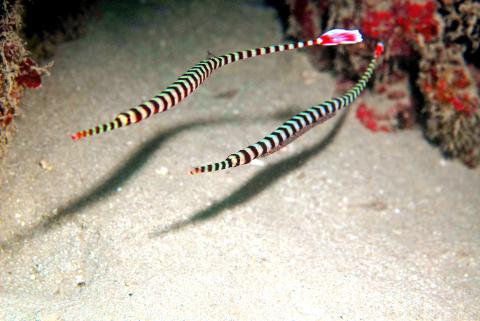The National Museum of Marine Biology and Aquarium in Pingtung County has established a new record by breeding the ringed pipefish (Dunckerocampus dactyliophorus), becoming the first institution in the world to do so.
The museum said that the achievement serves as an important reference for future egg-hatching and fish-fry cultivation projects and helps to ease the strain caused by commercial fishing, allowing local fishermen more time to prepare for the imminent challenge of the depleting amount of economic fish faced by fishing communities throughout the world.
By simulating the fish’s living environment with underwater caves and fissured corals, the museum was able to provide an environment where the fish could hatch their eggs, the museum said.

Photo: Copy by Tsai Tsung-hsien, Taipei Times
The average survival rate of the fish stood at about 37 percent on the 100th day after hatching, it said, adding that the first batch of offspring began mating in the 11th month post-hatching.
According to the museum, although pipefish are not an endangered species, more than 30 million are caught and sold each year because Asian consumers view them as a precious material for traditional Chinese medicine and it is highly sought after by aquariums around the world. These twin demands have led to its population diminishing over time.
The museum said that by conducting artificial breeding projects, marine biologists are able to improve their understanding of different species’ needs for survival and aid the preservation of rare and endangered species.
Ringed pipefish generally inhabit the Indian and Pacific oceans. Adults have a dark yellow body ringed with crimson or dark brown stripes from their mouths to their tails. The fish’s tail — red with white banding and a white dot in its center — makes them instantly identifiable.
The museum said that wild ringed pipefish are only interested in live food; if they cannot adapt to their food in captivity, they can become underweight or die.
There is very limited literature on ringed pipefish laying eggs or on breeding fry in captivity, it said, adding that the successful breeding provides valuable input for future artificial breeding projects.

Alain Robert, known as the "French Spider-Man," praised Alex Honnold as exceptionally well-prepared after the US climber completed a free solo ascent of Taipei 101 yesterday. Robert said Honnold's ascent of the 508m-tall skyscraper in just more than one-and-a-half hours without using safety ropes or equipment was a remarkable achievement. "This is my life," he said in an interview conducted in French, adding that he liked the feeling of being "on the edge of danger." The 63-year-old Frenchman climbed Taipei 101 using ropes in December 2004, taking about four hours to reach the top. On a one-to-10 scale of difficulty, Robert said Taipei 101

Nipah virus infection is to be officially listed as a category 5 notifiable infectious disease in Taiwan in March, while clinical treatment guidelines are being formulated, the Centers for Disease Control (CDC) said yesterday. With Nipah infections being reported in other countries and considering its relatively high fatality rate, the centers on Jan. 16 announced that it would be listed as a notifiable infectious disease to bolster the nation’s systematic early warning system and increase public awareness, the CDC said. Bangladesh reported four fatal cases last year in separate districts, with three linked to raw date palm sap consumption, CDC Epidemic Intelligence

US climber Alex Honnold left Taiwan this morning a day after completing a free-solo ascent of Taipei 101, a feat that drew cheers from onlookers and gained widespread international attention. Honnold yesterday scaled the 101-story skyscraper without a rope or safety harness. The climb — the highest urban free-solo ascent ever attempted — took just more than 90 minutes and was streamed live on Netflix. It was covered by major international news outlets including CNN, the New York Times, the Guardian and the Wall Street Journal. As Honnold prepared to leave Taiwan today, he attracted a crowd when he and his wife, Sanni,

Taiwanese and US defense groups are collaborating to introduce deployable, semi-autonomous manufacturing systems for drones and components in a boost to the nation’s supply chain resilience. Taiwan’s G-Tech Optroelectronics Corp subsidiary GTOC and the US’ Aerkomm Inc on Friday announced an agreement with fellow US-based Firestorm Lab to adopt the latter’s xCell, a technology featuring 3D printers fitted in 6.1m container units. The systems enable aerial platforms and parts to be produced in high volumes from dispersed nodes capable of rapid redeployment, to minimize the risk of enemy strikes and to meet field requirements, they said. Firestorm chief technology officer Ian Muceus said